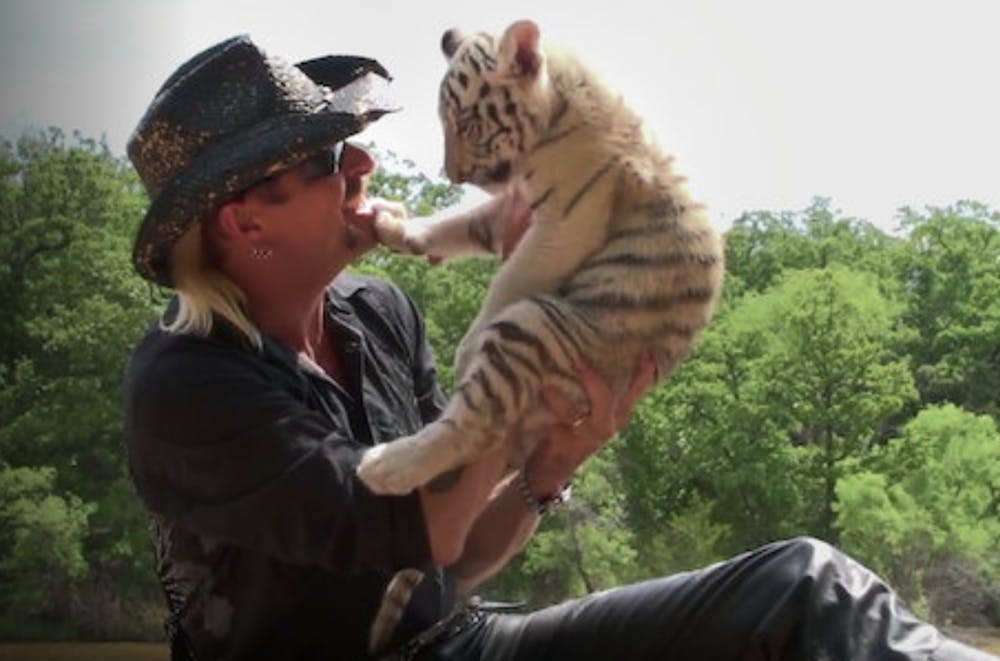The Netflix documentary series “Tiger King: Murder, Mayhem and Madness” follows the life of the eclectic big cat zoo owner, Joe Exotic. But did the series truly address all the problems associated with private zoos? No, it did not.
The eight-episode documentary series released on March 20 and gained popularity during the COVID-19 coronavirus pandemic. “Tiger King” looks into the daily life of Joseph Maldonado-Passage, also known as “Joe Exotic,” who operated The Greater Wynnewood Exotic Animal Park.
The series tells the story of his rise to fame, his employees and how they handle Exotic and the animals. It also explores Exotic’s life of polygamy, heartbreak and drugs.
Aside from Exotic’s life and zoo, the series also examines another big cat zoo, The Myrtle Beach Safari, owned by Bhagavan Antle. Antle partakes in a similar lifestyle to Exotic —breeding and exploiting animals for profit. This includes tiger cub petting zoo tours and more.
In the series, Exotic breeds and sells tiger cubs to other zoo owners and private individuals. According to the series, the cubs are only small enough to interact with the public until they are 12 weeks old. Tigers typically have a 16-20-year lifespan in captivity.
“Tiger King” focuses on Exotic’s rivalry with Carole Baskin, who runs Big Cat Rescue in Florida. Baskin tried to get Exotic’s zoo to close down for years. The rivalry with Exotic has led to harassment, pranks and even lawsuits. The series examines the disappearance and murder of Baskin’s second husband. There is no evidence that Baskin had anything to do with it, but Exotic vehemently believes otherwise
The amount of time the filmmakers spent focusing on the Exotic vs. Baskin feud could have been better spent. Instead of bringing murder allegations into the mix, they could have focused on ways to stop zoos like Exotic’s and Antle’s from existing. A small portion of the series is spent discussing big cat safety laws; however, the antics of Exotic overshadow throughout those portions.
As entertaining as the documentary series was made to be, it could have gone more in-depth about how zoos like Exotic’s profit off of the animals. These roadside zoos exploit tiger cubs, other big cats and animals. The sad reality is that these animals are suffering.
The audience gets a glimpse of some of the abuse that takes place in GW Exotics. Exotic, who is now in prison for attempted murder on Baskin, killed five tigers, violating the Endangered Species Act and allegedy killed multiple animals. In a bonus episode, zoo employees reveal most of the time the tigers that were killed were in healthy condition.
There are no laws protecting big cats, only The Big Cat Public Safety Act, which has not yet been passed. These zoos still exist and continue to make money by exploiting tigers. The treatment of the animals is inhumane.
The employees working in the zoos are treated inhumanely as well. The documentary series briefly touches on the unfair treatment, such as low wages and physical harm, the employees endure.
As much as the series did show that these kinds of people and zoos exist, it does not mean all animal sanctuaries are bad. It is zoos such as Exotic’s and Antle’s that cross the line.
“Tiger King” played up the drama and entertainment aspect. However, I do give them credit for bringing up the problems with the zoos mentioned in the series. In an ironic sense, the documentary's producers profited off of dramatizing a story about zoo-owners profiting off animals. I would have liked to see a call to action to prevent this from ever happening again, and how places like those can be shut down.




The Slate welcomes thoughtful discussion on all of our stories, but please keep comments civil and on-topic. Read our full guidelines here.